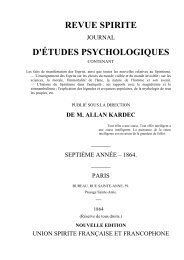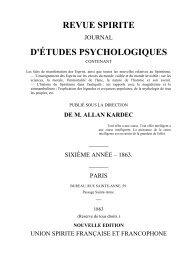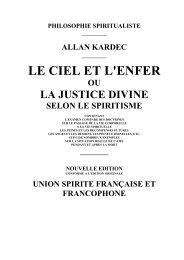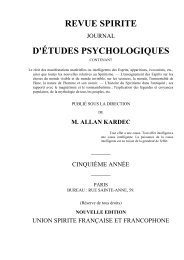PDF version - Geae
PDF version - Geae
PDF version - Geae
You also want an ePaper? Increase the reach of your titles
YUMPU automatically turns print PDFs into web optimized ePapers that Google loves.
which sends sorrow to us. He corrects us as a mother corrects her child, to teach it to do better. He works<br />
without cessation to purify and embellish our souls, which cannot be completely happy, save as they are<br />
perfected. For that purpose is the earthly apprenticeship. God has placed beside rare and fugitive joys, frequent<br />
and prolonged sorrows, in order that we may realize that our world is only a passageway, not a goal. Joys and<br />
sufferings–pleasures and sorrows – God has spread these things in our existence, as a great artist unites on his<br />
canvas the lights and shadows to produce his chef-d’oeuvre.<br />
Suffering is a rudimentary method of animal evolution. Through it they acquire the first dawning of<br />
consciousness. It is the same with human beings in successive incarnations. If, from its earthly stations, the<br />
soul were exempt from suffering, it would remain inert – passive, and ignorant of profound moral truths. Our<br />
aim is onward! Our destiny is to march toward the goal without stopping by the way. The joys of this world<br />
immobilize us, they retard us; then sorrow comes and pushes us forward. As soon as there opens for us a<br />
source of pleasure, for instance in our youth, love and marriage – and we lose ourselves in the enchantment of<br />
these blessings, almost always soon afterward an unforeseen circumstance arises, and the blade of sorrow is<br />
felt.<br />
In the measure that we advance in life, joys diminish and sorrows increase. The body becomes heavier<br />
– the weight of years more burdensome. With most lives, existence commences in happiness and ends in<br />
sadness. With age, the light grows dim, dreams vanish – sympathies and consolations lessen. Graves thicken<br />
about us; then come the long hours of inaction and suffering. They oblige us to enter into ourselves, and to<br />
review our lives. This is a necessary trial for the soul, in order that before it quits the body it may acquire a<br />
clear-seeing judgment of the events of its terrestrial careers. So when we curse the hours of age, which are in<br />
appearance desolate and sterile, we ignore one of the greatest benefits which nature has offered us. We forget<br />
that sorrowful old age is the crucible wherein the soul completes its purification.<br />
At this moment of existence the forces which during the years of virility we dispense in every<br />
direction in our exuberance, concentrate and converge toward the profound depths of being, awakening the<br />
consciousness and procuring wisdom for the man of maturity. Little by little harmony is established between<br />
our thoughts and the exterior radiations, and the inner melody chords with the melody divine. There is then, in<br />
resigned old age, more of grandeur and serene beauty than in the éclat of youth or the power of maturity.<br />
Under the action of time, all that is profound and everlasting in us frees itself, and the brows of certain aged<br />
men and women are aureoled with light from the Beyond.<br />
To all who ask ‘Why is sorrow?’ I respond: ‘Why do we polish the gem – sculpture the marble –<br />
hammer the iron – melt the glass?’ It is in order to build and ornament the magnificent temple full of rays, of<br />
vibrations, of hymns, of perfumes, where all the arts combine to express the divine; to prepare the apotheosis<br />
of conscious thought – to celebrate the liberation of the spirit. And behold the result obtained! All that is<br />
elementary in us departs. Material unformed, or ruined and broken, is by sorrow used to construct a splendid<br />
altar in the heart of man, of moral beauty and eternal truth. In the gross block of marble is hidden the ideal<br />
statue, and when man has not the energy, the knowledge, or the will to bring it forth, then comes sorrow. It<br />
takes the hammer and the chisel, and little by little, with strokes violent or persistent, the living statue is<br />
designed with supple contours and gleaming beauty. Under the broken quartz the glowing emerald shines!<br />
Yes, in order that the form comes forth in all its pure and delicate lines, that spirit triumphs over the<br />
substance, that the thoughts keep to sublime heights, that the poet finds his immortal accents, the musician his<br />
perfect chords, our hearts must feel the lancet of fate. We must know mourning and tears, ingratitude and<br />
treason, the deception of friends, and the anguish of disillusionment. We must see cherished forms descend<br />
into the tomb – youth depart, and old age come, with its bitter sorrows. Man must suffer, as the fruit of the<br />
vine is pressed that its exquisite liquid may be extracted.<br />
It is in our own consciousness that lies the reward of good and evil. It registers minutely all our acts,<br />
and sooner or later becomes a severe judge of the culpable ones who, by the law of evolution, finally yield to<br />
its voice and submit to its control. The spirit in space suffers remorse for its far distant wrong acts, as well as<br />
for the more recent ones. That is why it often asks to be reincarnated, that it may make reparation for evils<br />
committed, and gain freedom from obsessing memories.<br />
On different planes suffering changes its aspect. With us it becomes at once physical and moral, and<br />
constitutes a mode of reparation. The sad pages of our early history, where we were ignorant souls, we have<br />
120
















